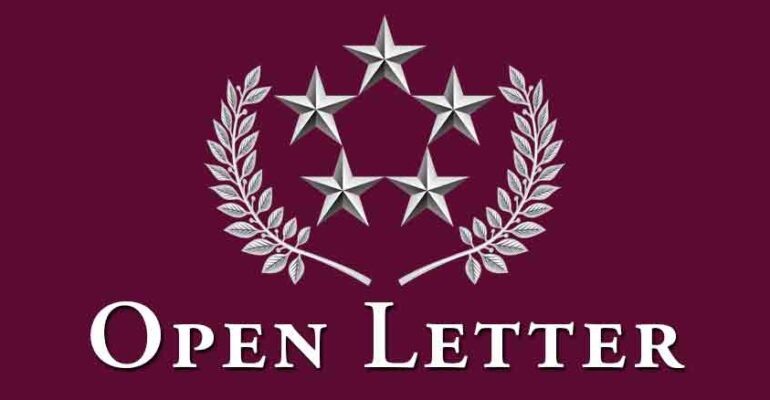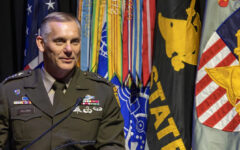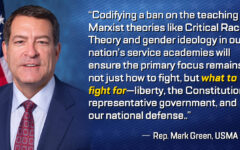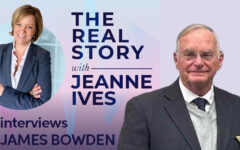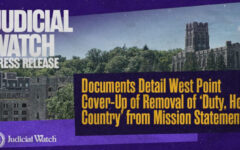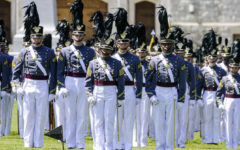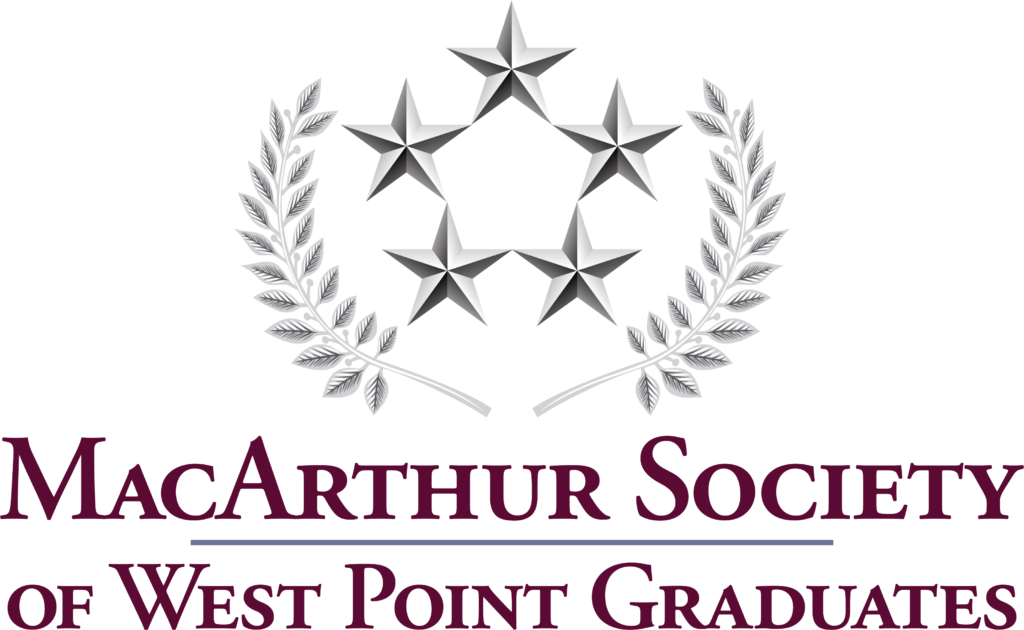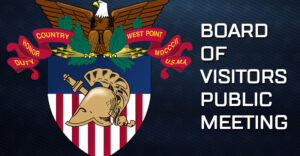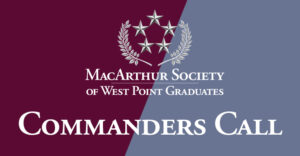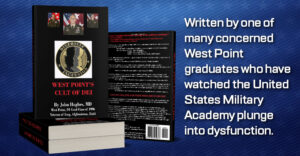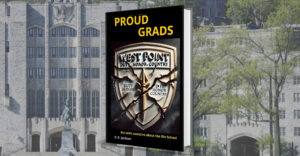Letter to Superintendent by 1968 Class Members
24 January 2024 2024-10-25 13:51Letter to Superintendent by 1968 Class Members
This letter was sent 7 November 2013
In response to the invitation of the Superintendent to elaborate on concerns raised during the Class Briefing at our 45th Reunion, a working group prepared the following document to describe several concerns that we share about the status of the Academy.
Our goal was not to talk about issues of concern but to suggest possible approaches to improve the identified areas. The document was prepared with the view that it was far better to provide a detailed discussion rather than depend upon a conversation at a later point to record these detailed concerns.
We also recognize that various concerns in the document might be passed along to others for reply and wanted to ensure sufficient detail available for consideration.
Working Group: Dr. Thomas Barnes; Charles Beckwith (COL, retired); David Clemm; Father Michael Cerrone (LTC, retired); Dr. Arthur Coogler (COL, retired); John Hedley (LTC, retired); Robert Hensler (COL, retired); Augustus Lee; Bogdan Kulikowski (COL, retired); Charles Mahan (LTG, retired); Marvin Markley; Ray Rhodes; Buren Shields (LTC, retired); Dr. Ralph Tildon
Detailed discussion is provided on the following areas:
- Degradation of Core Values
- Implications of the Diversity Goals
- Impact of the CTC Publication
- Respect Organization and the Rugby Club
- Role of the Association of Graduates & West-Point.org
- Advice from & Opinions of Graduates
While each area is presented as a stand-alone issue that may be dealt with by different senior leadership team members, the thread that encompasses all other areas is our lengthy discussion of the perceived Degradation of Core Values. Within each area, it is also recognized that a lack of information or incorrect perceptions may drive some thoughts.
For this reason, we have also suggested an increased understanding of graduates’ views and improvements in the flow of communications to all graduates more frequently and consistently. We also recognize that some of the issues identified will take time to repair if action is taken.
Still, it is essential to recognize the problem and identify and communicate what course of action will be accepted. While we applaud USMA’s recognition as an academic institution, we are concerned that in a time of reduced resources and the end of the wars, the institution does not lose sight of the fact that is has been and always should be a military academy.
We believe that ensuring the right kinds of officers and civilians are enlisted as faculty and that they remain focused on the teaching mission will be critical if West Point is to continue as a preeminent leader development institution.
Our working group, and we believe all graduates, want the Academy to continue to be a successful beacon for the military profession and the Country. We hope that in reviewing our comments, the senior leadership team will consider our concerns and identify how graduates can best assist in achieving this goal.
David Clemm
Class 1968
Degradation of Core Values
BACKGROUND:
A tectonic ethics shift has occurred in our national culture in fifty years. Increases in academic cheating, divorce, single-adult parenting, worker disengagement, generalized business fraud, degradation of the noble professions of theology, law, and medicine, and plummeting public faith in government have become the social norm.
The very terms of character, integrity, and ethics have been redefined in the negative axis. Noted ethicists have concluded that the United States has lost the traditional language and education in character and its moral center.
Meanwhile, the military continues to fight a twelve-year war that has stretched and, in some respects, notably harmed the moral and relational fabric that defines the United States Army. Senior officers and members of the officer and non-commissioned officer corps have committed painful errors in moral judgment and failed to take morally courageous actions expected of leaders in the profession of arms.
Within this backdrop, the following concerns have risen to the surface:
Core Values: Our spiritual and moral values came principally from our parents and families while being reinforced from the structure of religious, military, athletic, and academic training at USMA. We are concerned that there has been a loss in the meaning, importance, and belief in our motto of Duty, Honor, and Country at the Academy and in the officer ranks. This set of values and the Honor Code of our day have formed the basis of graduates seeking to live above the common level of life. Essential in our day was the Corps’ ownership of the Honor Code. While due process improvements have been made to the current system, we are concerned that they have resulted in sacrificing the Corps’ moral and operational ownership of their living standards at West Point. While the return of the Code and System to the Corps might entail severe consequences, we believe the result of not doing so would be more significant.
Academic Institution: USMA has succeeded in becoming an outstanding academic institution; Forbes ranked West Point Number One in 2009. While we applaud the recognition that USMA has received, we are concerned that in a time of reduced resources and the end of the wars that the institution does not lose sight of the fact that is has been and always should be a military academy. Nurturing the right kinds of officers and civilians enlisted as faculty and remaining focused on the teaching mission will be critical if West Point continues as a preeminent leader development institution.
We believe that the foreseeable but unintended consequence of becoming not only competitive but championship-grade in scholastics is that West Point’s academic house often thinks and operates as an academic institution and not as a military academy. We are concerned that the Academic Departments are keenly focused on research, publications, grant generation, recognition, inter-departmental competitions for funds and rivalries for awards, and the recruitment of Cadets to major in their departments. As a result of Graduates receiving advanced degrees in Philosophy, USMA faculty know the theories of virtue ethics and advanced intellectual knowledge. Still, we have observed that they need more effective leadership in ethics or actual character development.
While many faculty members are stronger officers due to their immersion in civilian graduate programs, many return with new doubts about the Army and the Nation and, worse, about the beliefs that led them to West Point and serve in the Army. Some PhDs in USMA research cells and centers of excellence need to learn more about the Army and less about West Point. Meanwhile, we are concerned that under the rubrics of research and academic freedom, they import a postmodern worldview into the Academy that runs counter to Army Values, Duty, Honor, Country, and politically unfettered practice of patriotism. In the name of academic freedom, the liberties won by blood are eroded by those who enjoy criticizing the values that protect their keyboards.
While the Class of 1968 was at West Point, we had many outstanding combat-tested officers, such as CPT Pete Dawkins and MAJ Norm Schwarzkopf, who provided counsel to many and were role models of what we could become as military professionals. Many of the current faculty have served multiple deployments. Yet, continuing to pursue academic preeminence without at least an equivalent commitment to the sustained development of the faculty and staff as leaders of character can unintentionally compromise the values that undergird the Academy. These new role models will impact the Corps of Cadets as they did when we were cadets.
Achievement of this academically preeminent goal also raises the question of why the Academy should continue to exist given its expense compared to any other excellent academic institution with an ROTC program. West Point’s exceptional mission for the Nation is creating leaders of character, and we support the Academy in preserving this unique commitment. We recommend recruiting leaders of character and USMA Graduates to teach in the key academic areas that impact character advancement.
The Military Academy’s uniqueness as the developer of character: USMA has long done the difficult. As the key Revolutionary War fortification, it defended the young Republic from defeat by the world’s greatest military power. As the Nation’s first engineering school, it poured the foundation of nation-building and selfless and courageous service that formed the greatest democracy in history.
As the world’s fourteenth-ranked military in 1941, it produced the leaders and formations to defeat the Axis Powers in four years in a global war of unprecedented scope and violence. It led the conversion of expansionist and genocidal fascist enemies into enduring, modern, non-aggressive democratic states. It produced astronauts for space, established the mold of the classic scholar-athlete-leader, and remade its academic infrastructure to be rated as the top college in the Nation.
However, it is suggested that West Point’s essential contribution to the Nation and the United States Army, both in mission and operational reality, is in producing leaders of character. Without character, technical competence is often achieved for personal gain instead of for selfless service. Without character and moral courage, intellect and education become the subjects of failed responsibility, morally broken officers and historic cautionary tales.
A Challenging Environment: The Academy and its leadership face many difficult choices. Many of these are driven by requirements to meet politically driven policies. Such policies appear to lead to a degradation of core values, questionable recruiting policies, and movement away from the core values upon which the institution is built. With a country split in many ways philosophically, it is understandable that military leaders may find themselves at odds with directives from military superiors and political leaders. Choosing the “harder right” under such circumstances is challenging.
The re-girding of West Point’s character mission will be as difficult as its earlier transitions. As an example, it is our understanding that some USMA faculty, after postgraduate education, teach Kohlberg’s Theory of Moral Development, which regards the development of genuinely virtuous individuals as unlikely. We also believe they teach Maslow’s Hierarchy of Needs, which places self-actualization as the ultimate in human development. A review of PME2 reveals that it also does not teach behavioral virtue ethics. Duty, Honor, Country, the West Point oath, Army values, virtue ethics and moral philosophy – which formed, protected, and preserved the American Republic – stand in stark contrast to postmodern psychological identity theories.
Increasingly, the Army and its schools advance psychological and sociological theories of human development that counter the virtue ethics, ancient principles, and fundamental traditions of the Nation and the United States Army. It may be difficult to advance character development on one side of the house while the other – which has the advantage in resources, numbers, and status – teaches its opposite. Given various budget constraints placed upon all government agencies, there is probably little understanding by most graduates concerning the ability of the Academy to allocate resources to support this effort or the need for additional resources from outside sources.
We are concerned that the foreseeable but unintended price of West Point’s commitment to becoming academically preeminent has been a silent loss of character content and effective delivery in the Academy’s responsibility to develop character competence. The imbalance between the two sides of the house is self-evident.
Our Understanding of the Superintendent’s Goals: Our recent understanding is that the Superintendent has embarked on a goal to repair and improve the character development program for the Corps of Cadets. In building an effective character development plan and schedule programs, the Academy and its leadership face difficult choices. Recognizing the momentous strategic consequences, the need for a visionary commander’s complex and right actions, and the historical moment at a decision point, we believe that the Class of 1968 and most graduates will support the Academy as it chooses the harder right.
As old Soldiers, as sons of West Point, and as citizens of the Republic who support and defend, and bear true faith and allegiance to the Constitution, we believe that most graduates will stand ready to support the Academy’s focus on character and ethics so that each graduate is a commissioned leader of character committed to the values of Duty, Honor, Country. The key question, however, is how best to do this.
QUESTIONS RAISED BY GRADUATES TO BE ADDRESSED BY ACADEMY LEADERSHIP:
Within this backdrop, it would be helpful to create a forum to address the following questions and to outline the program for the future:
- Has the Honor Code degraded and now become irrelevant?
- How have the Honor Code changes improved the ethics and character development of the Corps of Cadets?
- Has the Academy leadership been forced to compromise core values to align with political correctness and diversity?
- What uniquely distinguishes West Point from other excellent academic institutions with a robust ROTC program?
- Recognizing that the Academy leadership is in a very difficult situation, what role can graduates appropriately play in restoring what we believe is a loss of core values?
- Can resources be reallocated to increase support for existing ethics and character development activities or is there a need for additional help from outside sources to support such an activity?
SUGGESTIONS:
Consider the following options:
- Survey graduates on various issues impacting the Academy to understand their position, publish the results, and describe what actions will be taken, if any, as a result of the input.
- Expand the Cadet Ethics training program reaffirming certain national and military values and the Judeo-Christian virtues upon which our country was built.
- Restore the Honor Code to fundamental ownership by the Corps of Cadets.
- Create a forum and aggressive communications program to inform graduates of what has transpired, new goals for the future, and how graduates may assist and support these goals.
Implications of the Diversity Goals
BACKGROUND: During the class briefing the Superintendent highlighted the importance of achieving increased diversity in the Academy’s admissions efforts. While generally supportive of this goal, it appears the pendulum has swung too far in its implementation.
Classmates and members of the Admissions Field Force have authoritatively reported that, for the second year in a row, Letters of Assurance (LOAs) are not being given to qualified, white male applicants for the Class of 2018 unless they are recruited athletes. Instead, white males graduating from high school in 2014, who are not recruited athletes, and no matter how highly qualified, are eligible only for Letters of Encouragement (LOEs).
Throughout the country, there were specific cases of very well qualified, highly motivated applicants for the Class of 2017 (white males) that passed on going to West Point. Because they were unable to get LOAs, they informed classmates or members of the Admissions Field Force that they accepted admission to other top tier schools who were willing to grant them early assurance of admission. Conversely, we also understand that there were numerous candidates who were marginally qualified at best who were given LOAs, or assurance of admission to USMAPS, based on the desire to meet diversity goals.
Prior to last year’s recruitment cycle and the change in LOA criteria, these specific individuals would have been prime candidates for LOAs. This diversity-focused LOA award process continues today and seems to ignore the fact that what soldiers want and need is the most competent leaders the Army can provide.
With the above said, we agree that it is imperative that the opportunity of attending West Point be publicized far and wide to ensure the highest quality candidate pool. Logically, this may entail special out-reach efforts to “under-represented” groups who otherwise might not be motivated to apply.
However, using race, ethnicity, and gender as key criteria for admissions is likely to fail the Army and the American people for the sake of political correctness. We believe that most members of our Class share the opinion that West Point should not be a test bed for social engineering. Rather, the Academy’s goal should be to recruit the very best candidates possible without regard to ethnicity, race, or gender.
QUESTIONS RAISED BY GRADUATES TO BE ADDRESSED BY ACADEMY LEADERSHIP:
- Have the diversity goals outlined in the class briefing been directed by the Department of the Army, the Department of Defense, or someone at a higher level within the Chain of Command?
- How far down the path of matching race, ethnic, gender, and even religious affiliation must the service academies go to achieve what is deemed acceptable?
- Would having graduates lobby members of Congress to mute some of the political directives be helpful?
SUGGESTIONS:
- Explain the specific diversity goals currently in place, what they hope to achieve, and methods (if any) that have been implemented to measure the effectiveness (and not just in the attainment of diversity targets) of the approach in ultimately enhancing the officer corps.
- Immediately reinstitute the process in place prior to recruitment of the Class of 2017 for award of LOAs. The LOAs should, once again, be awarded based solely on merit without consideration of race, ethnicity, or gender.
- Change what are perceived as hard diversity “goals” to soft diversity “guidelines.” This would allow the Admissions Officers and Field Force Representatives to focus their attention on identifying and recruiting the very top candidates in the nation without the pressure of missing arbitrary diversity targets.
- Ensure only one standard is articulated and applied for candidate selection without regard to genetics.
Impact of the CTC Publication
BACKGROUND: In January 2013, the Counter Terrorism Center published Challengers from the Sidelines: Understanding America’s Violent Far-Right by Dr. Arie Perliger, Director of Terrorism Studies. The media interpretation of the publication created significant consternation among graduates due to the implications that graduates could easily be considered to be part of two Violent Far-Right groups within the study, anti-federalist & fundamentalists.
A small group within the Class of 1968 reviewed the publication in great detail and requested the Association of Graduates and the former Superintendent address our detailed concerns about the quality, interpretation, and analytical quality of the information presented as a study sanctioned by the United States Military Academy. After numerous communications both via email and telephone, it became clear that the AOG supported the Academy position that no problems existed, that all were satisfied with the study and how it evolved, and that no further action was required.
This led to a series of exchanges by David Clemm with all Class Officers other than the Class of 1968 and Society Presidents that could be reached via email. A series of interchanges with graduates across the spectrum reflected concerns about this publication and raised questions about whether this was reflective of other issues within the Academy.
Meetings with the CTC by representatives of three Classes providing support for the CTC provided some insight into the process which produced the publication, resulted in rejection of suggestions for improvement by the Class representatives, but produced a promise that a report on the Violent Far-Left would provide “balance” to the previous study. Unfortunately, none of the representatives in attendance were able to deal with the analytical quality of the data or to take issue with the author’s position that while admitting “correlation … need not imply causality” to then proceed to correlate higher levels of “far-right” violence with Republican Presidents and “conservative political environments.”
While this has not yet been communicated broadly to all graduates, BG Trainor confirmed with David Clemm that the data on the Violent Far-Left was insufficient to support publication of this study leaving only the previous study of questionable quality in place with no retraction, correction, or commentary about the status of this body of work. Information from a variety of sources suggests that this publication and the communications about it have had an impact on financial contributions to the Academy.
QUESTIONS RAISED BY GRADUATES TO BE ADDRESSED BY ACADEMY LEADERSHIP:
- Does the Academy genuinely assess that this was an appropriate publication coming from West Point and does the Academy support its content?
- Who within the Chain of Command approved its release?
- Does the veiled attempt to classify this as only the views of the author really absolve the Academy of any responsibility given the strong internal support and peer reviews and Dr. Perliger’s prominent role in the CTC?
- Given Dr. Perliger’s views, do you have any concerns regarding his current role in or his vision in
- Do/did cadets have any role in all of this? If so, do you think it is or would be appropriate to have cadet time spent working on or studying this project?
- Do you think this will have an impact on the attitudes and financial support of Academy graduates toward the institution?
- How many graduates do you believe would think this study is a great use of the funds they have contributed?
- Are there not higher priority targets for the CTC to be looking at other than citizens of the US?
- Is some commentary from the AOG warranted to explain your position and/or support for Dr. Perliger’s findings?
- What actions will you and the Academy take?
SUGGESTIONS:
Prepare a message to all graduates and Societies for presentation to its members. Hopefully, this can be done via a You Tube type communication to gain the full impact of the Academy leadership speaking to graduates. Any communication should address the following:
- Communications to graduates to date on this entire issue have been flawed. It is important for the Academy leadership to both explain what has happened and discuss what is planned for the future. This should not be a simple one-page letter but should provide sufficient detail to alert all graduates to what has transpired and use technology where possible. In particular, the communication must deal with the planned two-part publication which has now been canceled noting why one has a flawed data set and the other does not.
- Accept previous recommendations by contributing Classes to the CTC that a few non-Academic graduates participate in the peer review process for selecting topics for study by the CTC and reviewing the publication prior to publication.
- If mistakes were made, simply admit them, explain what they were, and describe what actions will be taken to prevent similar problems in the future.
- Apologize for offending graduates by inferences made in the publication.
- Consider the thoughts of General McCaffrey in preparing a response to graduates: “The Terrorism Center has done some really superb work.” “Suspect this is just a misguided small study from an academic.” “In my view this Center should stay out of the domestic ideology wars. Let the FBI study (under the appropriate limitations of US law) how to protect us from the many, many armed nut groups in the US from: the right and the left, the cartels, organized crime, urban gangs, cyber hackers, et al.”
Respect Organization and the Rugby Club
Please note that in reviewing what follows that we do not wish to intrude on the Cadet disciplinary system. However, with only rumors to go on and a near complete blackout of information, we simply want some concrete information provided to alumni recognizing that a substantial number of former rugby team members funded the Anderson complex.
BACKGROUND: During the Class briefing the Superintendent noted that his number one mission as directed by the Secretary of the Army was to eliminate Sexual Harassment and Sexual Assault. While fully supportive of this goal, some questions have arisen regarding whether the pendulum has swung too far in the implementation of this goal. A number of the Class of 1968 were members of the Rugby Club. In our day, we recall that our Rugby songs after the game with our opponents could become a bit profane – but all in good fun – with no personal attacks at either our team or the opponents – and certainly not aimed at our lady guests.
It is our understanding that the new Rugby facility may now only be used by the Women’s Rugby team due to unacceptable “online” postings by some of the members of the Men’s Rugby Club – a decision by USMA leadership based on information gathered about the incident that also led to the cancellation of participation by the Men’s Rugby Team in 2013.
Graduates that financially supported the building of the new facility are obviously interested in what transpired that led to the prohibition of use of the facility. While limited information is available on what transpired, it appears the entire team was involved and was punished. Apparently, there was a cadet “respect” position within the Rugby Club and an Officer with that duty (Respect Officer) that initiated the inquiry/investigation after being given a copy of one of the weekly reports by another cadet who showed it to the “respect” Cadet.
Of particular interest is gaining an understanding of what comprised the “re-education” process that was part of the severe punishment to all the Men’s Rugby Team Firsties, with reduced punishments to Cows, Yearlings, and Plebes. Their punishments left the impression that ALL were involved and all approved of the postings. Perhaps the biggest concern has to do with the increasingly active “respect” organization at West Point, its role, & its impact on the Chain of Command.
QUESTIONS RAISED BY GRADUATES TO BE ADDRESSED BY ACADEMY LEADERSHIP:
The goal of the questions that follow are to understand how a difficult and serious situation was approached:
- Was there a formal investigation of the incident and what were the findings?
- Is it possible to gain a copy of the findings of the investigation to those that financially supported building of the new Rugby Club facility including excerpts of the weekly emails that were approved by the Firsties who determined what would be printed each week; the “re-education” package for all the rugby players, including a complete description of punishment “tours” or hours on the area, hours in classes, et.al.?
- Should interested parties file a Freedom of Information Act (FOIA) request to access materials, even if redacted – or ask for (and accept as the final word) USMA leadership’s rationale for their decision?
- Who appoints the Respect Personnel, what instruction have they been given, and to whom do they report?
SUGGESTIONS:
Communications regarding events such as these are important for graduates to understand. Having the media describe events and results frequently produces an incorrect picture of the rationale and/or the results. Once the formal investigation process has run its course, consider the following:
- Explain what happened and what action was taken.
- Use the incident to explain why the Academy believes that a “respect” organization is necessary, its role in Cadet life, and why it is deemed critical in today’s environment.
- Appoint a person to whom additional requests for information should be directed.
Role of the Association of Graduates & West-Point.org
We recognize that both the Association of Graduates and West-Point.org are private organizations. Prior to discussing our concerns with either organization, however, it would be helpful to understand the views of the Academy leadership regarding both organizations.
BACKGROUND: The Association of Graduates was founded in 1869 to serve West Point and its graduates. “Today, it continues to strengthen the bonds of the ‘Long Gray Line’ through communications and services to graduates, Classes and Societies; as well as building relationships with current Cadets at West Point.” In 2012 the Class of 1968 began a series of research surveys to expand participation in the decision processes and to improve communications within the Class. The Communications Survey was initiated to understand how to improve communications within the Class as well as to assess the state of communications with the Association of Graduates. Efforts to engage the AOG with the effort were met with resistance, a request that no questions be asked about the AOG, and little interest in understanding or using the results. Efforts to provide sample information about the research activities through the AOG to Classes or Societies were rejected.
In the minds of some graduates the question has arisen as to whether the AOG serves only the Superintendent as a fund raising arm and that it has minimal interest in serving graduates despite the information provided in the booklet provided at our 45th Reunion. We believe that most graduates miss the Assembly that was discontinued due to cost constraints and declining subscriptions, although efforts were made by the AOG to provide partial replacement with the West Point magazine and Taps (with paid subscription). While Class Notes can be found on the AOG website, several problems exist with both the website and with interaction with the AOG. Due to the significant increase in fund raising efforts by the AOG, some graduates refuse to provide contact information to the AOG limiting their exposure to both the Class and the Academy. Other graduates, particularly older graduates, may find it difficult to access the AOG website due to their technical skills or access to the Internet.
It is also noted that a duplication of effort exists between the role of the AOG and the role of West-Point.org that adds confusion to the flow of communications to graduates and other friends of the Academy. In an attempt to avoid the fund raising arm of the AOG, some graduates have chosen to use this as the vehicle to gain access to Class Notes and other information. While the AOG may have a broader reach, West-Point.org has consistently demonstrated its ability to cost effectively use technology to transmit information to graduates, family of cadets, and cadets. Given the interaction of some of us on specific issues with the AOG, an argument can be made that if the AOG were a for profit business, that it would cease to exist.
QUESTIONS RAISED BY GRADUATES TO BE ADDRESSED BY ACADEMY LEADERSHIP:
- What do you view as the role of the AOG vs. West-Point.org?
- How do you plan/hope to use the AOG and West-Point.org in the future?
- Do you have any suggestions on how best to utilize the strengths of the AOG and West-Point.org and minimize the duplication of activities?
- What areas do you see where improvements are needed to increase the flow of communications to graduates?
SUGGESTIONS:
- The AOG and West-Point.org should be used collectively using the strengths of each to improve and increase the flow of effective communications from the Academy leadership to graduates
- A number of us believe that West-Point.org is more effective in defining and using technology for communications than the AOG and should be utilized to assist the Academy leadership in dispersing its message on key issues.
- The AOG and West-Point.org should be encouraged to define methods to reach out to older graduates with limited access to technology.
Advice from & Opinions of Graduates
- : Over time the ability to meet with the growing number of graduates has become more difficult. The span in ages and experiences potentially creates a diversity of views across graduates and limited ability of the Academy leadership to filter the views. When problems or opportunities arise, the Academy leadership may rely on the Association of Graduates for input, but this group also has no formal process to understand the views of graduates. There does not appear to be an effective process to solicit views and advice from graduates on an on-going basis. As the access to government funding declines, financial contributions from graduates will play an ever-increasing role to achieve needed facilities and services. We believe that understanding the views and defining an on-going process to improve the flow of information, suggestions, and support should be considered critical.
QUESTIONS RAISED BY GRADUATES TO BE ADDRESSED BY ACADEMY LEADERSHIP:
- Is it important to have input or understand the views of graduates even if they choose not to accept those positions; e.g. changes to the lyrics in ; changes in wording to the Cadet Prayer, the publication of the CTC article in January 2013; how best to communicate financial needs in a difficult government funding environment?
- Would the Academy leadership support more active engagement by graduates in an advisory role?
SUGGESTIONS:
Consider the following options:
- Survey graduates on a variety of issues impacting the Academy to understand their position, publish the results, and describe what actions will be taken, if any, as a result of the input.
- Create an Advisory Council composed of graduates that can be called upon by the Academy leadership when situations arise where they feel it would be helpful to have additional insight.
______
Kohlberg, Lawrence (1973). “The Claim to Moral Adequacy of a Highest Stage of Moral Judgment”. Journal of Philosophy (The Journal of Philosophy, Vol. 70, No. 18) 70(18): 630–646.

